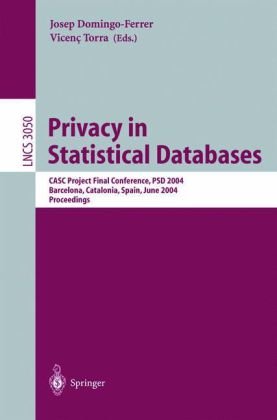

Most ebook files are in PDF format, so you can easily read them using various software such as Foxit Reader or directly on the Google Chrome browser.
Some ebook files are released by publishers in other formats such as .awz, .mobi, .epub, .fb2, etc. You may need to install specific software to read these formats on mobile/PC, such as Calibre.
Please read the tutorial at this link: https://ebookbell.com/faq
We offer FREE conversion to the popular formats you request; however, this may take some time. Therefore, right after payment, please email us, and we will try to provide the service as quickly as possible.
For some exceptional file formats or broken links (if any), please refrain from opening any disputes. Instead, email us first, and we will try to assist within a maximum of 6 hours.
EbookBell Team

0.0
0 reviewsPrivacy in statistical databases is about ?nding tradeo?s to the tension between the increasing societal and economical demand for accurate information and the legal and ethical obligation to protect the privacy of individuals and enterprises, which are the source of the statistical data. Statistical agencies cannot expect to collect accurate information from individual or corporate respondents unless these feel the privacy of their responses is guaranteed; also, recent surveys of Web users show that a majority of these are unwilling to provide data to a Web site unless they know that privacy protection measures are in place. “Privacy in Statistical Databases2004” (PSD2004) was the ?nal conference of the CASC project (“Computational Aspects of Statistical Con?dentiality”, IST-2000-25069). PSD2004 is in the style of the following conferences: “Stat- tical Data Protection”, held in Lisbon in 1998 and with proceedings published by the O?ce of O?cial Publications of the EC, and also the AMRADS project SDC Workshop, held in Luxemburg in 2001 and with proceedings published by Springer-Verlag, as LNCS Vol. 2316. The Program Committee accepted 29 papers out of 44 submissions from 15 di?erentcountriesonfourcontinents.Eachsubmittedpaperreceivedatleasttwo reviews. These proceedings contain the revised versions of the accepted papers. These papers cover the foundations and methods of tabular data protection, masking methods for the protection of individual data (microdata), synthetic data generation, disclosure risk analysis, and software/case studies.